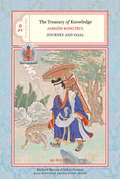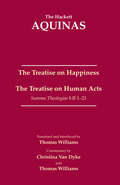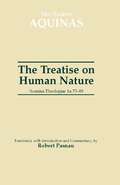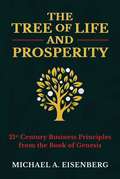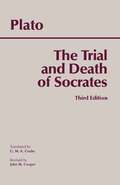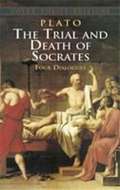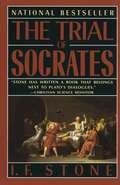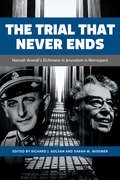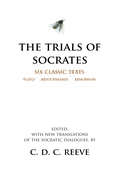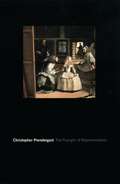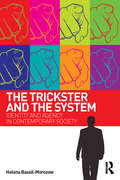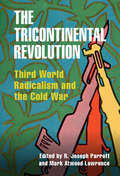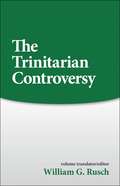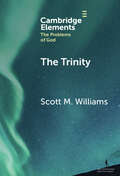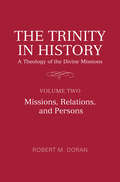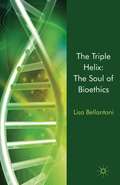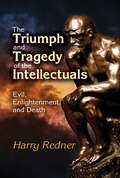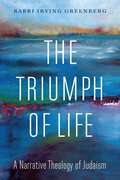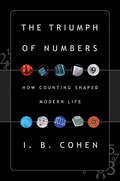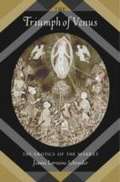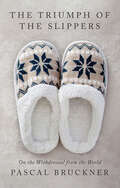- Table View
- List View
The Treasury of Knowledge, Books 9 and 10: Journey and Goal (The Treasury of Knowledge #10)
by Jamgön KongtrulThis is the final volume of a 10-volume set.
The Treatise on Happiness • The Treatise on Human Acts
by Thomas Aquinas Christina Van DykeThe fifth volume of The Hackett Aquinas, a series of central philosophical treatises of Aquinas in new, state-of-the-art translations accompanied by a thorough commentary on the text.Acclaim for previous volumes in the series:The Treatise on Human Nature Translated, with Commentary, by Robert Pasnau "This very readable and accurate translation of the so-called Treatise on Human Nature strikes the right balance between literal rendition of Aquinas' Latin and naturalness of English expression, and thus will be of use both to new students of Aquinas and to those familiar with the original Latin. The commentary on the text should make the translation especially suitable for use in courses on Aquinas' philosophy of human nature and theory of knowledge." —Deborah Black, University of TorontoThe Treatise on the Divine Nature Translated, with Commentary, by Brian J. Shanley, O.P. "That Shanley's translation-cum-commentary can open students to such a rich appropriation of Aquinas explains why I call it 'superb.'" —David Burrell, The ThomistDisputed Questions on Virtue Translated by Jeffrey Hause and Claudia Eisen Murphy; Commentary by Jeffrey Hause "Hause and Murphy are to be congratulated. [Their volume's] strong points are numerous and important. The translation is clear and faithful. . . . Hause offers an extended commentary which is solid and helpful for beginning readers. . . . A gem." —R. E. Houser, Notre Dame Philosophical Reviews
The Treatise on Human Nature: Summa Theologiae 1a 75-89
by Thomas Aquinas Robert PasnauThis series offers central philosophical treatises of Aquinas in new, state-of-the-art translations distinguished by their accuracy and use of clear and nontechnical modern vocabulary. Annotation and commentary accessible to undergraduates make the series an ideal vehicle for the study of Aquinas by readers approaching him from a variety of backgrounds and interests.
The Tree of Life and Prosperity: 21st Century Business Principles from the Book of Genesis
by Michael A. EisenbergOne of Israel&’s most successful venture capitalists uses the words and actions of the Hebrew patriarchs to lay the foundations for a modern growth economy based on timeless business principles and values.Entrepreneurs, businessmen, and investors are constantly looking for principles and rules that will pave the way for success. Usually, those at the forefront are successful entrepreneurs from Silicon Valley or legendary Wall Street investors. But the principles of economic growth, wealth creation and preservation were written long before the rise of the modern market economy and its heroes. Michael Eisenberg—one of the most successful venture capitalists in Israel, and one of the first investors in Lemonade, and Wix—reveals in The Tree of Life and Prosperity the eternal principles for successful business, economics, and negotiation hidden in the Torah—and shows their relevance to the modern world we live in.
The Trial and Death of Socrates, 3rd edition: Euthyphro, Apology, Crito, death scene from Phaedo (Hackett Classics)
by Plato G. M. A. Grube John M. CooperThe third edition of The Trial and Death of Socrates presents G. M. A. Grube's distinguished translations, as revised by John Cooper for Plato, Complete Works. A number of new or expanded footnotes are also included along with a Select Bibliography.
The Trial and Death of Socrates: Four Dialogues
by Plato Benjamin JowettAmong the most important and influential philosophical works in Western thought: Euthyphro, exploring the concepts and aims of piety and religion; Apology, a defense of the integrity of Socrates' teachings; Crito, exploring Socrates' refusal to flee his death sentence; and Phaedo, in which Socrates embraces death and discusses the immortality of the soul.
The Trial of Socrates
by I. F. StoneIn unraveling the long-hidden issues of the most famous free speech case of all time, noted author I.F. Stone ranges far and wide over Roman as well as Greek history to present an engaging and rewarding introduction to classical antiquity and its relevance to society today.
The TrialThat Never Ends: Hannah Arendt's 'Eichmann in Jerusalelm' in Retrospect
by Richard J. Golsan Sarah MisemerThe fiftieth anniversary of the Adolf Eichmann trial may have come and gone but in many countries around the world there is a renewed focus on the trial, Eichmann himself, and the nature of his crimes. This increased attention also stimulates scrutiny of Hannah Arendt’s influential and controversial work, Eichmann in Jerusalem. The contributors gathered together by Richard J. Golsan and Sarah M. Misemer in The Trial That Never Ends assess the contested legacy of Hannah Arendt’s famous book and the issues she raised: the "banality of evil", the possibility of justice in the aftermath of monstrous crimes, the right of Israel to kidnap and judge Eichmann, and the agency and role of victims. The contributors also interrogate Arendt’s own ambivalent attitudes towards race and critically interpret the nature of the crimes Eichmann committed in light of newly discovered Nazi documents. The Trial That Never Ends responds to new scholarship by Deborah Lipstadt, Bettina Stangneth, and Shoshana Felman and offers rich new ground for historical, legal, philosophical, and psychological speculation.
The Trials of Academe: The New Era of Campus Litigation
by Amy GajdaOnce upon a time, virtually no one in the academy thought to sue over campus disputes, and, if they dared, judges bounced the case on grounds that it was no business of the courts. Tenure decisions, grading curves, course content, and committee assignments were the stuff of faculty meetings, not lawsuits. Not so today. As Amy Gajda shows in this witty yet troubling book, litigation is now common on campus, and perhaps even more commonly feared. Professors sue each other for defamation based on assertions in research articles or tenure review letters; students sue professors for breach of contract when an F prevents them from graduating; professors threaten to sue students for unfairly criticizing their teaching. Gajda’s lively account introduces the new duo driving the changes: the litigious academic who sees academic prerogative as a matter of legal entitlement and the skeptical judge who is increasingly willing to set aside decades of academic deference to pronounce campus rights and responsibilities. This turn to the courts is changing campus life, eroding traditional notions of academic autonomy and confidentiality, and encouraging courts to micromanage course content, admissions standards, exam policies, graduation requirements, and peer review. This book explores the origins and causes of the litigation trend, its implications for academic freedom, and what lawyers, judges, and academics themselves can do to limit the potential damage.
The Trials of Socrates: Six Classic Texts
by Plato Aristophanes Xenophon C. D. ReeveLampooned in 406 B.C.E. in a blistering Aristophanic satire, Socrates was tried in 399 B.C.E. on a charge of corrupting the youth, convicted by a jury of about five hundred of his peers, and condemned to death. Glimpsed today through the extant writings of his contemporaries and near-contemporaries, he remains for us as compelling, enigmatic, and elusive a figure as Jesus or Buddha. Although present-day (like ancient Greek) opinion on the real Socrates diverges widely, six classic texts that any informed judgment of him must take into account appear together, for the first time, in this volume. Those of Plato and Xenophon appear in new, previously unpublished translations that combine accuracy, accessibility, and readability; that of Aristophanes' Clouds offers these same qualities in an unbowdlerized translation that captures brilliantly the bite of Aristophanes' wit. An Introduction to each text and judicious footnotes provide crucial background information and important cross-references.
The Triangle of Representation
by Christopher PrendergastMoving deftly among literary and visual arts, as well as the modern critical canon, Christopher Prendergast's book explores the meaning and value of representation as both a philosophical challenge (What does it mean to create an image that "stands for" something absent?) and a political issue (Who has the right to represent whom?).The Triangle of Representation raises a range of theoretical, historical, and aesthetic questions, and offers subtle readings of such cultural critics as Raymond Williams, Paul de Man, Edward Said, Walter Benjamin, and Hélène Cixous, in addition to penetrating investigations of visual artists like Gros, Ingres, and Matisse and significant insights into Proust and the onus of translating him. Above all, Prendergast's work is a striking display of how a firm grounding in theory is essential for the exploration of art and literature.
The Tribal Imagination: Civilization and the Savage Mind
by Robin FoxWe began as savages, and savagery has served us well—it got us where we are. But how do our tribal impulses, still in place and in play, fit in the highly complex, civilized world we inhabit today? This question, raised by thinkers from Freud to Levi-Strauss, is fully explored in this book by the acclaimed anthropologist Robin Fox. It takes up what he sees as the main—and urgent—task of evolutionary science: not so much to explain what we do, as to explain what we do at our peril. Ranging from incest and arranged marriage to poetry and myth to human rights and pop icons, Fox sets out to show how a variety of human behaviors reveal traces of their tribal roots, and how this evolutionary past limits our capacity for action. Among the questions he raises: How real is our notion of time? Is there a human “right” to vengeance? Are we democratic by nature? Are cultural studies and fascism cousins under the skin? Is evolutionary history coming to an end—or just getting more interesting? In his famously informative and entertaining fashion, drawing links from Volkswagens to Bartok to Woody Guthrie, from Swinburne to Seinfeld, Fox traces our ongoing struggle to maintain open societies in the face of profoundly tribal human needs—needs which, paradoxically, hold the key to our survival.
The Trickster and the System: Identity and agency in contemporary society
by Helena Bassil-MorozowFor centuries, the trickster has been used in various narratives, including mythological, literary and cinematic, to convey the idea of agency, rebellion and, often turbulent, progress. In The Trickster and the System: Identity and Agency in Contemporary Society, Helena Bassil-Morozow shows how the trickster can be seen as a metaphor to describe the psycho-anthropological concept of change, an impulse that challenges the existing order of things, a progressive force that is a-structural and anti-structural in its nature. The book is about being able to see things from an unusual, even ‘odd’, perspective, which does not coincide with the homogenous normality of the mass, or the social system, or a political ideology, or some other kind of authority. The Trickster and the System offers an analytical paradigm which can be used to examine relationships between tricksters and systems, change and stability, in a wide range of social, political and cultural contexts. It covers a range of systems, describes different types of tricksters and discusses possible conflicts, tensions and dialogues between the two opposing sides. One of the central ideas of the book is that social systems use shame as a tool to control and manage all kinds of tricksters – individuality, agency, creativity, spontaneity, innovation and initiative, to name but a few. The author argues that any society that neglects its tricksters (agents of change), ends up suffering from decay, stagnation – or even mass hysterical outbursts. The Trickster and the System: Identity and Agency in Contemporary Society provides a fresh perspective on the trickster figure in a variety of cultural contexts. It covers a range of psychological, cultural, social and political phenomena, from personal issues to the highest level of society’s functioning: self-esteem and shame, lifestyle and relationships, creativity and self-expression, media, advertising, economy, political ideology and, most importantly, human identity and authenticity. The book is essential reading for scholars in the areas of psychoanalysis, analytical psychology, myth, cultural and media studies, narrative analysis, cultural anthropology, as well as anyone interested in critical issues in contemporary culture. Helena Bassil-Morozow is a cultural philosopher, film scholar and academic writer whose many publications include Tim Burton: The Monster and the Crowd (Routledge, 2010) and The Trickster in Contemporary Film (Routledge, 2011). Helena is currently working on another Routledge project, Jungian Film Studies: the Essential Guide (co-authored with Luke Hockley). Her principal academic affiliation is the University of Bedfordshire, Faculty of Creative Arts, Technologies & Science.
The Tricontinental Revolution: Third World Radicalism and the Cold War (Cambridge Studies in US Foreign Relations)
by Mark Atwood Lawrence R. Joseph ParrottThe Tricontinental Revolution provides a major reassessment of the global rise and impact of Tricontinentalism, the militant strand of Third World solidarity that defined the 1960s and 1970s as decades of rebellion. Cold War interventions highlighted the limits of decolonization, prompting a generation of global South radicals to adopt expansive visions of self-determination. Long associated with Cuba, this anti-imperial worldview stretched far beyond the Caribbean to unite international revolutions around programs of socialism, armed revolt, economic sovereignty, and confrontational diplomacy. Linking independent nations with non-state movements from North Vietnam through South Africa to New York City, Tricontinentalism encouraged marginalized groups to mount radical challenges to the United States and the inequitable Euro-centric international system. Through eleven expert essays, this volume recenters global political debates on the priorities and ideologies of the Global South, providing a new framework, chronology, and tentative vocabulary for understanding the evolution of anti-imperial and decolonial politics.
The Trinitarian Controversy
by William G. RuschThe purpose of this series is to allow an English-reading public to gain firsthand insights into these significant times for Christianity by making available in a modern, readable English the fundamental sources which chronicle how Christianity and its theology attained their normative character. This volume explores the development of the doctrine of the Trinity in the patristic church as a result of the Arian controversy:Arius -- Letter to Eusebius of Nicomedia Arius -- Letter to Alexander of Alexandria Alexander of Alexandria -- Letter to Alexander of Thessalonica The Synodal Letter of the Council of Antioch, A. D. 325 The Creed of the Synod of Nicaea (June 19, 325) The Canons of Nicaea, A. D. 325 Eusebius of Caesarea -- Letter to His Church concerning the Synod at Nicaea Arius -- Letter to the Emperor Constantine Athanasius -- Orations against the Arians, Book 1 Gregory of Nazianzus -- Third Theological Oration concerning the Son Gregory of Nyssa -- Concerning We Should Think of Saying That There Are Not Three Gods to Ablabius Augustine of Hippo -- On the Trinity, Book 9
The Trinity (Elements in the Problems of God)
by Scott M. WilliamsThe doctrine of the Trinity, proclaimed by Christians through the Nicene-Constantinople creed, is foundational to traditional Christian belief and worship of God. But is this doctrine logically coherent? How can there be three divine persons (Father, Son, and Holy Spirit), each is God, and yet there is only one God? This is a fundamental question for philosophers, but theologians have additional questions. This Element addresses philosophical and theological issues concerning the Trinity: Hermeneutical and Logical problems, Personal Pronouns, Monarchy, Equality, the Greek vs. Latin filioque debate, Real Relations, Unity of Action, Self-Knowledge in the Trinity, and Simplicity. Based on my recent rediscovery of the sixth ecumenical council's (Constantinople III) clarifications of Trinitarian doctrine, this Element introduces Conciliar Trinitarianism and shows how it responds to the issues, including a resolution to the fundamental logical question. It also compares Conciliar Trinitarianism with Miaphysite, neo-Sabellian, Social, and other models of the Trinity.
The Trinity in History
by Robert M. Doran SJThe Trinity in History is the first volume in a new series by Robert M. Doran that uses the thought of Bernard Lonergan to develop a unified field structure for systematic work in theology. Building on his successful and thought-provoking Theology and the Dialectics of History and What Is Systematic Theology?, Doran works out a starting point for a contemporary theology of history and proposes a new application of the 'psychological analogy' for understanding the Christian doctrine of the Trinity.Advancing the work of Lonergan, Augustine, and Thomas Aquinas, The Trinity in History also enters into conversation with contemporary philosophical emphases, especially with the mimetic theory of noted anthropological philosopher René Girard. Doran suggests several refinements of Lonergan's notion of functional specialization - developing a perspective for including the data of various religious traditions in theological construction, and establishing this theory's relevance for contemporary interreligious dialogue.
The Trinity in History: Volume Two: Missions, Relations, and Persons (Lonergan Studies #2)
by Robert M. Doran, S.J.The second volume of Robert M. Doran’s magisterial The Trinity in History continues his exploration of the Trinitarian theology of Bernard Lonergan, focusing now on the notions of relations and persons and connecting the systematic proposals with the so-called "Third Quest for the Historical Jesus." Doran not only interprets Lonergan’s major work in Trinitarian theology and Christology but also suggests at least a twofold advance: a new version of the psychological analogy for understanding Trinitarian doctrine and a new starting point for the whole of systematic theology. He links these theological concerns with René Girard’s mimetic theory, proposes a theory of history based in Lonergan’s scale of values, and creates a link between exegetical and historical scholarship and systematic theology.
The Triple Helix: The Soul of Bioethics
by Lisa BellantoniLisa Bellantoni argues that contemporary bioethics divides into two logically incommensurable positions: a cult of rights, which identifies the worth of human life with our autonomy, and a cult of life, which identifies human worth with the possession of a soul, and thereby, of human dignity.
The Triumph and Tragedy of the Intellectuals: Evil, Enlightenment, and Death
by Harry RednerThis fourth instalment of Harry Redner's tetralogy on the history of civilization argues that intellectuals have a brilliant past, a dubious present, and possibly no future. He contends that the philosophers of the seventeenth century laid the ground for the intellectuals of the eighteenth century, the Age of Enlightenment. They, in turn, promoted a fundamental transformation of human consciousness: they literally intellectualized the world. The outcome was the disenchantment of the world in all its cultural dimensions: in art, religion, ethics, politics, and philosophy.In this fascinating study, Redner demonstrates how secularization took the sting out of both the dread and promise of an afterlife and intellectuals learned to die without the hope of immortality popularized by philosophy and religion. Ultimately, they produced the ideologies that generated the totalitarian regimes of the twentieth century, which subsequently exterminated these intellectuals through mass murder on a scale never before experienced. The book traces the sources of this fatal entanglement and goes on to examine the contemporary condition of intellectuals in America and the world.Wherein lies the future of the intellectuals? Redner suggest that in the present state of globalization, dominated by technocrats, experts, and professionals, their fate remains uncertain.
The Triumph of Empire
by Michael KulikowskiMichael Kulikowski takes readers into the political heart of imperial Rome, beginning with the reign of Hadrian, who visited the farthest reaches of his domain and created stable frontiers, to the decades after Constantine the Great, who overhauled the government, introduced a new state religion, and founded a second Rome.
The Triumph of Life: A Narrative Theology of Judaism
by Rabbi Irving (Yitz) GreenbergThe Triumph of Life is Rabbi Irving Greenberg&’s magnum opus—a narrative of the relationship between God and humanity as expressed in the Jewish journey through modernity, the Holocaust, the creation of Israel, and the birth of Judaism&’s next era. Greenberg describes Judaism&’s utopian vision of a world created by a God who loves life, who invites humans to live on the side of life, and who enables the forces of life to triumph over death. The Bible proclaims our mission of tikkun olam, repairing the world, such that every human image of God is sustained in the fullness of our dignity. To achieve this ideal, Judaism offers the method of covenant—a realistic, personal, incremental partnership between God and humanity across generations in which human beings grow ever more responsible for world repair. Greenberg calls on us to redirect humanity&’s unprecedented power in modernity to overcome poverty, oppression, inequality, sickness, and war. The work of covenant requires an ethic of power—one that advances life collaboratively and at a human pace—so that the Jewish people and all humanity can bring the world toward the triumph of life.
The Triumph of Numbers: How Counting Shaped Modern Life
by I. Bernard CohenFrom the pyramids to mortality tables, Galileo to Florence Nightingale, a vibrant history of numbers and the birth of statistics. The great historian of science I. B. Cohen explores how numbers have come to assume a leading role in science, in the operations and structure of government, in marketing, and in many other aspects of daily life. Consulting and collecting numbers has been a feature of human affairs since antiquity--taxes, head counts for military service--but not until the Scientific Revolution in the twelfth century did social numbers such as births, deaths, and marriages begin to be analyzed. Cohen shines a new light on familiar figures such as Thomas Jefferson, Benjamin Franklin, and Charles Dickens; and he reveals Florence Nightingale to be a passionate statistician. Cohen has left us with an engaging and accessible history of numbers, an appreciation of the essential nature of statistics.
The Triumph of Venus: The Erotics of the Market
by Jeanne Lorraine SchroederIn this ambitious and innovative work, Professor Schroeder applies Hegelian philosophy and Lacanian psychoanalysis, as well as classical mythologies, to argue for a reinterpretation of our understanding of economic markets.
The Triumph of the Slippers: On the Withdrawal from the World
by Pascal BrucknerSince the beginning of the 21st century, global warming, terrorism, the pandemic and now the war in Ukraine have created a widespread feeling that the world is an increasingly dangerous place. In response to this situation, it is understandable that many people are inclined to retreat to the safety of their home – the last refuge and safeguard against the savagery of the outside world. But the home is not just a shelter: it is a space that supplants and replaces the world, a wired cocoon that gradually renders any journey to the outside world superfluous. From our couch, we can enjoy remotely the pleasures once offered by the cinema, the theatre and the café. Everything, from food to love to art, can be delivered to your door. Armed with a smartphone and a Netflix account, why would anyone risk life and limb to venture out to the cinema? Compulsory confinement, the nightmare of the pandemic years, seems to have been replaced by voluntary self-confinement. Fleeing from the cities, working remotely, relinquishing travel and tourism, we risk becoming reclusive creatures that cower at the slightest tremor. In this witty and spirited book, Pascal Bruckner takes aim at today’s voluntary seclusionism and the self-inflicted atrophy that comes with it, tracing its philosophical contours and historical roots. It is no longer the tyranny of lockdowns that threatens us but rather the tyranny of the sofa: will the slipper and the dressing gown be the new symbols of tomorrow's world?
